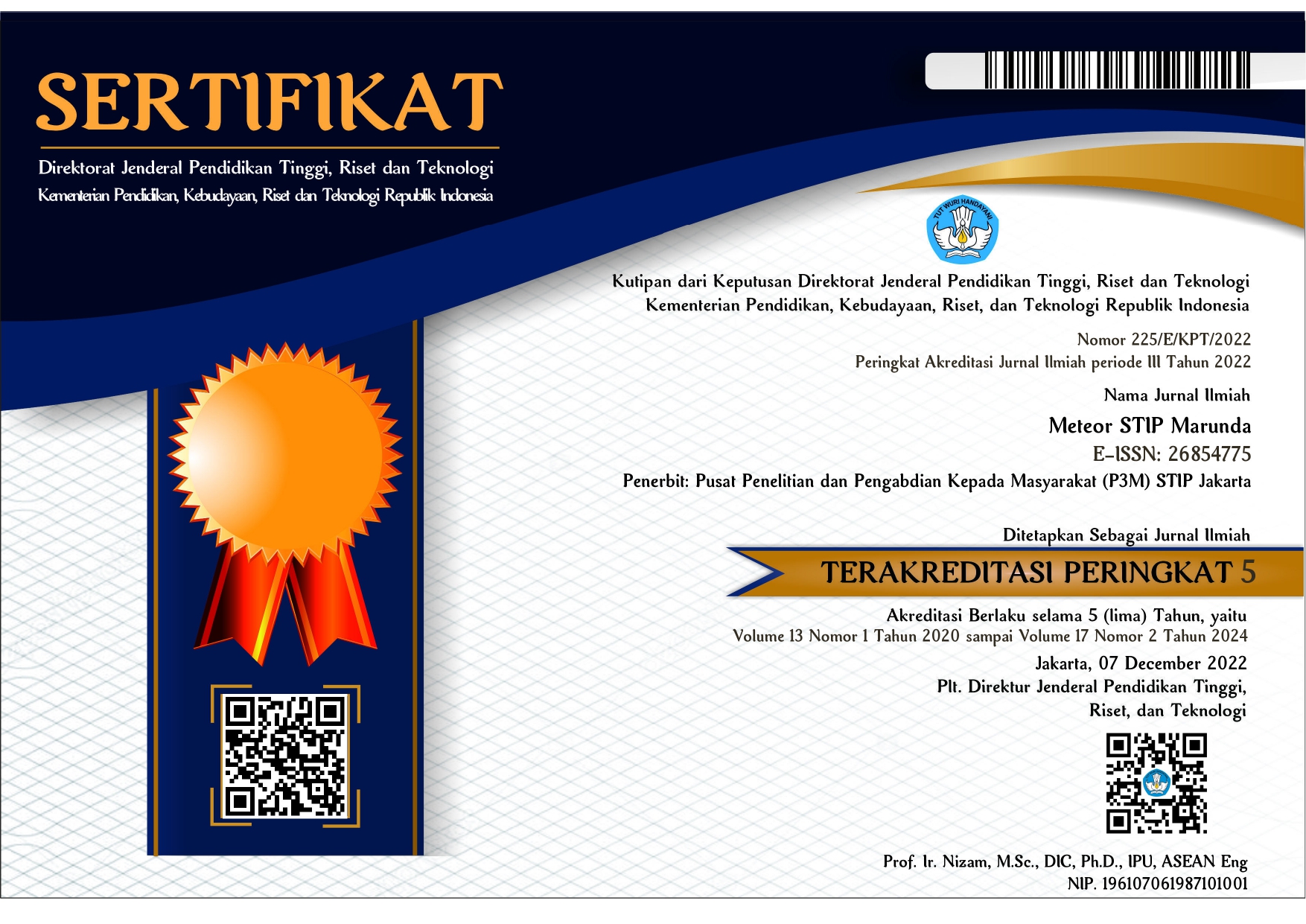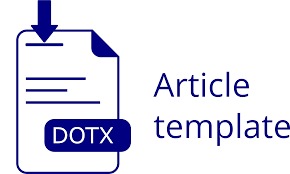SIMULATION-BASED LEARNING IN MARITIME TRAINING: ENHANCING COMPETENCY AND PREPAREDNESS
Abstract
Simulation-Based Learning (SBL) is a pivotal component in maritime education, offering realistic and immersive experiences for cadets. This research critically evaluates SBL's efficacy among 30 cadets undergoing vocational practice or internships, aligning with International Maritime Organization (IMO) - Standards of Training, Certification, and Watchkeeping (STCW). Through qualitative analysis, SBL was found to significantly enhance cadets' competency, decision-making skills, and confidence in handling maritime challenges. Challenges such as technical issues and fidelity discrepancies were noted, underscoring the need for ongoing improvement. Furthermore, the study emphasizes the importance of aligning maritime education with international standards to ensure standardized and comprehensive training. The findings contribute to the discourse on SBL's role in maritime education, highlighting its potential to prepare cadets for real-world scenarios effectively.
References
M. Plaza-Hernández, A. B. Gil-González, S. Rodríguez-González, J. Prieto-Tejedor, and J. M. Corchado-Rodríguez, “Integration of IoT technologies in the maritime industry,” in Distributed Computing and Artificial Intelligence, Special Sessions, 17th International Conference, 2021, pp. 107–115.
Y. Autsadee, J. Jeevan, N. H. Bin Mohd Salleh, and M. R. Bin Othman, “Digital tools and challenges in human resource development and its potential within the maritime sector through bibliometric analysis,” J. Int. Marit. Safety, Environ. Aff. Shipp., vol. 7, no. 4, p. 2286409, 2023.
F. C. Domingues, “907 Maritime History and Maritime Archaeology,” The Oxford Handbook of Maritime Archaeology. Oxford University Press, p. 0, Dec. 12, 2013. doi: 10.1093/oxfordhb/9780199336005.013.0039.
I. Christodoulou-Varotsi and D. A. Pentsov, “The STCW Convention and related instruments,” Marit. Work Law Fundam. Responsible Shipowners, Reliab. Seafar., pp. 422–639, 2008.
C. Young, “Comprehensive Revision of the STCW convention: an overview,” J. Mar. L. Com., vol. 26, p. 1, 1995.
M. G. Jamil and S. O. Isiaq, “Teaching technology with technology: approaches to bridging learning and teaching gaps in simulation-based programming education,” Int. J. Educ. Technol. High. Educ., vol. 16, pp. 1–21, 2019.
R. Kidd and E. McCarthy, “Maritime education in the age of autonomy,” WIT Trans. Built Environ., vol. 187, pp. 221–230, 2019.
O. Dyagileva, N. Goridko, H. Popova, S. Voloshynov, and A. Yurzhenko, “Ensuring sustainable development of education of future maritime transport professionals by means of network interaction,” 2020.
M. G. Jamil and Z. Bhuiyan, “Deep learning elements in maritime simulation programmes: a pedagogical exploration of learner experiences,” Int. J. Educ. Technol. High. Educ., vol. 18, pp. 1–22, 2021.
A. M. Ellsworth, “A New Generation of Teachers,” Research Anthology on Developing Critical Thinking Skills in Students. IGI Global, pp. 1183–1207, 2021. doi: 10.4018/978-1-7998-3022-1.ch061.
D. Onen, “Cultivating Critical Thinking Amongst University Graduate Students,” Research Anthology on Developing Critical Thinking Skills in Students. IGI Global, pp. 1104–1119, 2021. doi: 10.4018/978-1-7998-3022-1.ch057.
K. Cicek, E. Akyuz, and M. Celik, “Future skills requirements analysis in maritime industry,” Procedia Comput. Sci., vol. 158, pp. 270–274, 2019.
D. Gavalas, T. Syriopoulos, and E. Roumpis, “Digital adoption and efficiency in the maritime industry,” J. Shipp. Trade, vol. 7, no. 1, p. 11, 2022.
R. Sparrow, T. Dartanto, and R. Hartwig, “Indonesia under the new normal: Challenges and the way ahead,” Bull. Indones. Econ. Stud., vol. 56, no. 3, pp. 269–299, Sep. 2020, doi: 10.1080/00074918.2020.1854079.
A. M. Baylon and V. Santos, “The challenges in Philippine maritime education and training,” Int. J. Innov. Interdiscip. Res., vol. 1, no. 1, pp. 34–43, 2011.
G. Moodie, “Identifying vocational education and training,” J. Vocat. Educ. Train., vol. 54, no. 2, pp. 249–266, 2002.
H. Bitar and S. Alismail, “Exploring enablers and inhibitors of eHealth educational tools: The needs of women searching for HPV and cervical cancer information,” DIGITAL HEALTH, vol. 8. SAGE Publications, p. 2147483647, 2022. doi: 10.1177/20552076221130189.
E. Sarıcan and E. B. GÜNEŞ, “Developing Critical Thinking Skills in Elementary School Students Through Foreign Language Education: An Action Research.” Center for Open Science, 2021. doi: 10.31235/osf.io/3cjsv.
S. Ghosh, M. Bowles, D. Ranmuthugala, and B. Brooks, “On a lookout beyond STCW: Seeking standards and context for the authentic assessment of seafarers,” in 15th Annual General Assembly of the International Association of Maritime Universities, IAMU AGA 2014-Looking Ahead: Innovation in Maritime Education, Training and Research, 2014, pp. 77–86.
D. Franceschi, “The features of maritime English discourse,” Int. J. English Linguist., vol. 4, no. 2, p. 78, 2014.
N. R. Council, Frontiers in massive data analysis. National Academies Press, 2013.
S. Sarosa, Analisis Data Penelitian Kualitatif. Pt Kanisius, 2021.
D. K. Padgett, Qualitative methods in social work research, vol. 36. Sage publications, 2016.
J. W. Creswell and V. L. P. Clark, “Choosing a mixed methods design,” in Designing and Conducting Mixed Methods Research, California: Sage Publications, Inc., 2011, pp. 53–106.
A. Castleberry and A. Nolen, “Thematic analysis of qualitative research data: Is it as easy as it sounds?,” Curr. Pharm. Teach. Learn., vol. 10, no. 6, pp. 807–815, 2018.
J. Holland and J. Holland, “Implications of shifting technology in education,” TechTrends, vol. 58, pp. 16–25, 2014.
A. Aurigi and N. Odendaal, “From ‘smart in the box’ to ‘smart in the city’: Rethinking the socially sustainable smart city in context,” J. Urban Technol., vol. 28, no. 1–2, pp. 55–70, 2021.












_(1)(1).png)

